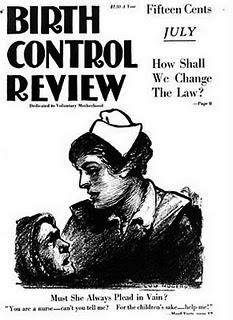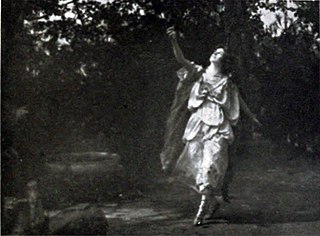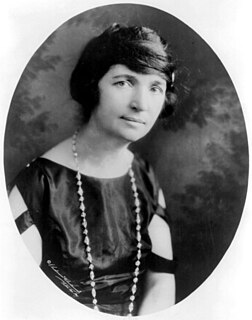
The Office of Management and Budget (OMB) is the largest office within the Executive Office of the President of the United States (EOP). OMB's most prominent function is to produce the President's Budget, but OMB also measures the quality of agency programs, policies, and procedures to see if they comply with the president's policies and coordinates inter-agency policy initiatives.

The Comstock Laws were a set of federal acts passed by the United States Congress under the Grant administration along with related state laws. The "parent" act was passed on March 3, 1873, as the Act for the "Suppression of Trade in, and Circulation of, Obscene Literature and Articles of Immoral Use". This Act criminalized usage of the U.S. Postal Service to send any of the following items:

Planned Parenthood Federation of America, Inc. (PPFA), or Planned Parenthood, is a nonprofit organization that provides reproductive health care in the United States and globally. It is a tax-exempt corporation under Internal Revenue Code section 501(c)(3) and a member association of the International Planned Parenthood Federation (IPPF). PPFA has its roots in Brooklyn, New York, where Margaret Sanger opened the first birth control clinic in the U.S. in 1916. Sanger founded the American Birth Control League in 1921, which changed its name to Planned Parenthood in 1942.

The Friends Committee on National Legislation (FCNL) is a lobbying organization in the public interest founded in 1943 by members of the Religious Society of Friends. FCNL works for social and economic justice, peace, stewardship of the environment, and good government in the United States.

The Marijuana Policy Project (MPP) is the largest organization working solely on marijuana policy reform in the United States in terms of its budget, number of members, and staff. Its stated aims are to: (1) increase public support for non-punitive, non-coercive marijuana policies; (2) identify and activate supporters of non-punitive, non-coercive marijuana policies; (3) change state laws to reduce or eliminate penalties for the medical and non-medical use of marijuana; and (4) gain influence in Congress. MPP advocates taxing and regulating the possession and sale of marijuana in a manner similar to alcohol, envisions a nation where marijuana education is honest and realistic, and believes treatment for problem marijuana users should be non-coercive and geared toward reducing harm.

Mary Coffin Ware Dennett was an American women's rights activist, pacifist, homeopathic advocate, and pioneer in the areas of birth control, sex education, and women's suffrage. She co-founded the Voluntary Parenthood League, served in the National American Women's Suffrage Association, co-founded the Twilight Sleep Association, and wrote a famous pamphlet on sex education and birth control.
The American Birth Control League (ABCL) was founded by Margaret Sanger in 1921 at the First American Birth Control Conference in New York City. The organization promoted the founding of birth control clinics and encouraged women to control their own fertility. In 1942, the league became the Planned Parenthood Federation of America.
Clarence James Gamble, married to Sarah Merry Bradley-Gamble, was the heir of the Procter and Gamble soap company fortune. He was an advocate of birth control and eugenics, and founded Pathfinder International.

The National Birth Control League was a United States organization founded in the early 20th century to promote the education and use of birth control.

The Lobbying Disclosure Act of 1995 was legislation in the United States aimed at bringing increased accountability to federal lobbying practices in the United States. The law was amended substantially by the Honest Leadership and Open Government Act of 2007. Under provisions which took effect on January 1, 1996, federal lobbyists are required to register with the Clerk of the United States House of Representatives and the Secretary of the United States Senate. Anyone failing to do so is punishable by a civil fine of up to $50,000. The clerk and secretary must refer any acts of non-compliance to the United States Attorney for the District of Columbia.
Timeline of reproductive rights legislation, a chronological list of laws and legal decisions affecting human reproductive rights. Reproductive rights are a sub-set of human rights pertaining to issues of reproduction and reproductive health. These rights may include some or all of the following: the right to legal or safe abortion, the right to birth control, the right to access quality reproductive healthcare, and the right to education and access in order to make reproductive choices free from coercion, discrimination, and violence. Reproductive rights may also include the right to receive education about contraception and sexually transmitted infections, and freedom from coerced sterilization, abortion, and contraception, and protection from gender-based practices such as female genital cutting (FGC) and male genital mutilation (MGM).

Katharine Martha Houghton Hepburn was a U.S. feminist social reformer and a leader of the suffrage movement in the United States. Hepburn served as president of the Connecticut Woman Suffrage Association before joining the National Woman's Party. Alongside Margaret Sanger, Hepburn co-founded the organization that would become Planned Parenthood. She was the mother of Academy Award-winning actress Katharine Hepburn.

The birth control movement in the United States was a social reform campaign beginning in 1914 that aimed to increase the availability of contraception in the U.S. through education and legalization. The movement began in 1914 when a group of political radicals in New York City, led by Emma Goldman, Mary Dennett, and Margaret Sanger, became concerned about the hardships that childbirth and self-induced abortions brought to low-income women. Sanger, in particular, simultaneously sought to connect birth control to the organized eugenics movement, regularly appealing to the authority of eugenic scientists Karl Pearson, Charles Davenport, and others in her Birth Control Review from the early 1920s. Such figures sought to prevent population segments they deemed genetically 'undesirable' from reproducing. While seeking legitimacy for the birth control movement partly through the approval of organized eugenics, Sanger and other activists also worked on the political front. Since contraception was considered to be obscene at the time, the activists targeted the Comstock laws, which prohibited distribution of any "obscene, lewd, and/or lascivious" materials through the mail. Hoping to provoke a favorable legal decision, Sanger deliberately broke the law by distributing The Woman Rebel, a newsletter containing a discussion of contraception. In 1916, Sanger opened the first birth control clinic in the United States, but the clinic was immediately shut down by police, and Sanger was sentenced to 30 days in jail.

Birth control in the United States is a complicated issue with a long history.
The Voluntary Parenthood League (VPL) was an organization that advocated for contraception during the birth control movement in the United States. The VPL was founded in 1919 by Mary Dennett. The VPL was a rival organization to Margaret Sanger's American Birth Control League. The VPL lobbied to change anti-contraception laws. In 1925 the VPL merged with the American Birth Control League.
The Birth Control Council of America (BCCA) was a short-lived organization that was established 1937 to reconcile the activities of the American Birth Control League (ABCL) and the Birth Control Clinical Research Bureau (BCCRB). The goal was to reduce redundancy, improve cooperation, and discuss the future of the birth control movement in the United States. The BCCA was created following the 1936 United States v. One Package of Japanese Pessaries federal court case, effectively removing legal obstacles limiting the ability of doctors to import, disseminate and prescribe contraceptives.
The Birth Control International Information Centre (BCIIC) (1929–38) was a London-based independent, international clearinghouse for birth control information established by American birth control leader Margaret Sanger and British suffragist Edith How-Martyn. It supported the establishment of clinics and maternity advice centers abroad, sponsored lecture tours and a conference.

Juliet Barrett Rublee was an American birth control advocate, suffragist, and film producer. She was married to George Rublee.















